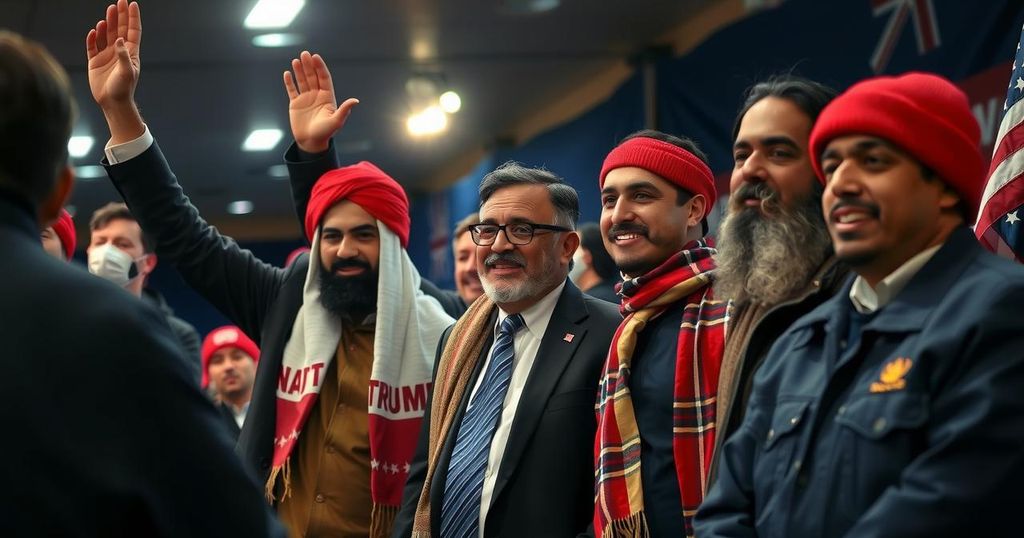Shift in Michigan: Arab-Americans Lean Towards Trump Amid Discontent with Democrats

Arab-American voters in Michigan are moving towards supporting Donald Trump, driven by frustration with the Biden administration’s handling of foreign policy and cultural issues. Historically Democratic, this demographic now seeks representation and responsiveness from political leaders. The shift may significantly impact electoral outcomes in swing state Michigan.
The regional dynamics of Michigan’s political landscape are undergoing notable shifts as some Arab-American voters, traditionally aligned with the Democratic Party, begin to consider supporting Donald Trump in the upcoming election. This surprising development stems from dissatisfaction with the current administration’s foreign policy, particularly regarding the unrest in Gaza and Lebanon, and a perceived lack of attention to their community’s needs. Interviews with young voters in areas like Dearborn and Hamtramck revealed a growing inclination towards Trump, driven by feelings of disenchantment with Vice President Kamala Harris and the Democratic leadership. For instance, Jubran Ali, an 18-year-old first-time voter, articulated a sentiment widely echoed among his peers, stating, “We don’t know what she is going to provide… I think it’s just a safer bet to go for Donald Trump.” Similarly, Edris Alhady expressed a similar consensus, revealing that many around him were leaning towards Trump. This demographic plays a crucial role in Michigan, a pivotal swing state that can determine electoral outcomes. In the previous elections, Trump managed to secure Michigan by a narrow margin, and the numbers from recent contests indicate a polarizing landscape where even minor shifts in voter sentiment can have significant repercussions. Leadership figures within the Arab-American community, such as Mayor Amer Ghalib of Hamtramck, openly acknowledge their disappointment in the Democrats. Ghalib stated, “It’s a combination of two things. Disappointment and hope,” highlighting the electorate’s changing priorities driven by the socio-political climate. Furthermore, he noted a lack of engagement from Harris’s team regarding his community’s concerns. Remarkably, sentiments of frustration are not merely limited to foreign policy issues. The local response to cultural dynamics, such as recent political tensions surrounding LGBTQ+ rights, has underscored a desire for a more balanced approach to social issues. Ghalib elaborated on this, noting an increasing perception of aggression in imposing certain cultural values upon their community. The political discourse extends beyond mere revenge against the Biden administration but encompasses a broader search for identity and representation. Indeed, residents express fear that voting for someone like Trump, whom they label a “wild card,” could prove beneficial in ways the liberal Democrats have not addressed. Issues of genocide and foreign relations sharply influence voter feeling, positioning them to leverage their votes as a form of protest against what they see as systemic neglect by the Democratic Party. As observed, Trump’s recent visits to Michigan and his explicit outreach to Arab-American communities signify a strategic attempt to capitalize on this growing discontent. Abdulkhalim Alsadeh, a leader within the Yemeni-American Democratic Party caucus, underscored concerns that this shift might represent a larger nationwide trend of disillusionment with the Democratic Party’s handling of its minority constituents. Alsadeh candidly stated, “The Republican nominee, former president Donald Trump, reached out to the Yemeni-American community. They sat with him. They talked with him,” indicating Trump’s effort to foster connections within the community while raising alarms about the Democrats’ misreading of the electoral mood. As Michigan’s electoral landscape continues to evolve, these sentiments could significantly influence voter turnout and sway the outcome of the election, underscoring the complexities within the American political fabric today.
The changing political climate among Arab-American voters, particularly in swing states like Michigan, is significant in the context of the upcoming elections. Historically aligned with the Democratic Party, this demographic appears increasingly disenchanted with the current leadership, especially regarding the administration’s handling of foreign policy, notably in relation to the conflicts in the Middle East. The Arab-American community is one of the largest ethnic groups in Michigan, and their voting decisions are crucial in determining the outcomes of highly contested elections. This shift in allegiance towards Trump raises questions about the Democratic Party’s strategy and outreach efforts to minority voters, especially amidst criticism from within these communities.
The growing trend of Arab-American voters in Michigan considering support for Donald Trump represents a remarkable shift fueled by dissatisfaction with the Democratic leadership, particularly with policies addressing international and domestic issues. Mayor Ghalib’s endorsement of Trump highlights a sentiment of disappointment, signaling a potential electoral divergence that could have profound implications in the key battleground state. As these voters feel increasingly unheard by the Democrats, their swing could tilt the results in upcoming elections, marking a notable point of contention within the diverse American electorate.
Original Source: news.sky.com







